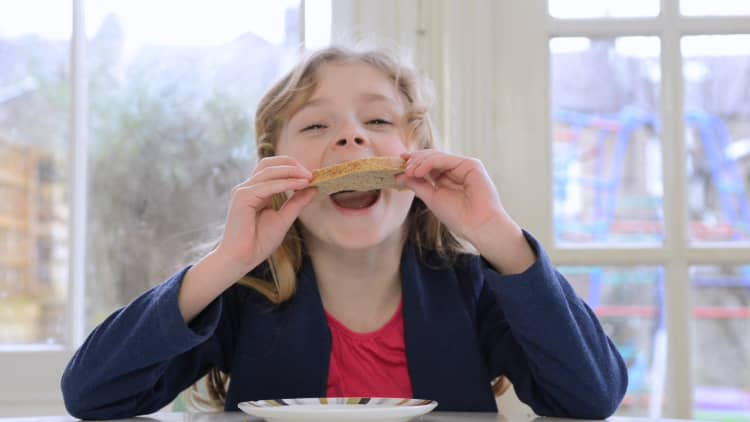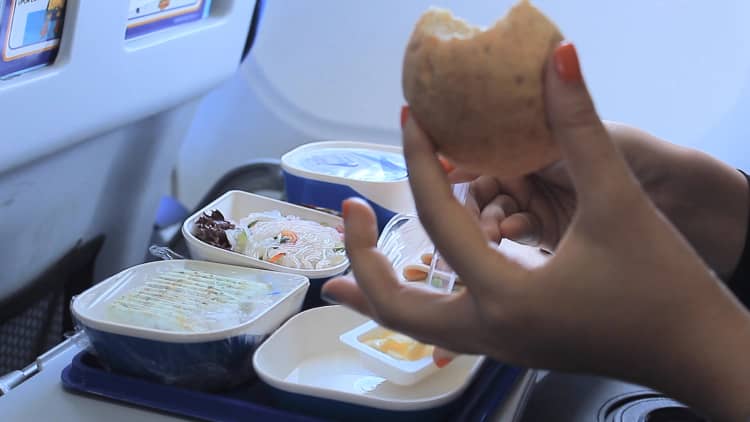A record-breaking 112.5 million Americans are expected to travel to visit friends and family this holiday season. If you're one of the nearly 7 million flying to your destination this week, you may want to avoid some foods that are served in the air, especially if you're prone to illness, food safety experts say.
While on-board meals are held to strict safety standards, the risk of bacteria can be greater in the air due to the lag time between when the food is prepared and when it's served, according to airline food safety expert Jean Dible.
"In the restaurant industry, food is cooked and served without delay," Dible says. "In the aviation industry, food is prepared at a catering company and then packed in insulated containers and trucked to airports to be put aboard the aircraft." That can make it difficult to control the temperature of the food.
"Incorrect holding temperatures is the number one reason for food-borne illness on a worldwide basis," Dible says.
To play it safe, here are six types of foods she and other experts suggest you avoid when you're dining above the clouds.
Dairy
Food safety pros recommend avoiding dairy products like yogurt, cottage cheese and ice cream on planes because they are particularly susceptible to spoilage when not kept cold.
And you wouldn't necessarily be able to see or smell the signs, since bacteria like listeria can contaminate dairy in ways that aren't readily apparent. "You can't see anything — there's no odor, nothing you can see. It's invisible," she says. And airline catering companies do not always dispose of food when they should, Dible adds.
Deli meats
Because your favorite sandwich meats are usually ready-to-eat, they don't go through a re-heating process to kill any bacteria, says Aurora Saulo, a professor of food safety and an extension specialist in food technology at the University of Hawaii. That's why sliced turkey, bologna and the like pose a higher risk of listeria contamination, according to the FDA.
It becomes really important, then, that foods like sandwiches be "kept at a temperature that will discourage the multiplication of pathogens," Saulo says. "It's mainly about maintaining a temperature so it can be given to the passengers."

Ice
Bacteria can survive in ice cubes, research shows. What makes ice on airplanes problematic, according to food safety experts, is a lack of rigorous food safety training among flight attendants. That means they may not always properly wash hands or use gloves when they're scooping the ice and pouring your drinks.
"I do not use ice on a plane," food safety expert Melvin Kramer of the EHA Consulting Group tells CNBC. "I find the flight attendants almost wash their hands in the ice."
Raw fruits and vegetables
Think twice before you reach for that salad: Raw fruits and veggies, like deli meats, are usually consumed without further heating to protect you from any potential contamination, Dible says.
Melons and leafy greens like lettuce pose a more substantial risk, since both are exposed to many kinds of bacteria from the soil, water and composted manure while they're growing in the fields. And if there's bacteria on the outside of a cantaloupe, for example, Dible says, cutting it up will transfer the bacteria to the inside, edible part, even if someone in the kitchen washes the fruit first.
Fruits and vegetables can also be contaminated while being stored and transported, Dible says, and, with melon in particular, bacteria could double every 20 minutes if the fruit is held at the wrong temperature.
Sprouts can be risky because they need warm, humid conditions to grow — and those are the same conditions favored by bacteria, she adds. Raw and lightly cooked sprouts like alfalfa and pea varieties have been linked to several Salmonella, E. coli, and listeria outbreaks.
Incorrect holding temperatures is the number one reason for food-borne illness on a worldwide basis.Jean Dibleairline food safety expert
Rice
Uncooked rice commonly contains Bacillus cereus bacteria, which can survive cooking temperatures. If the rice is then cooled down or stored at the wrong temperature, the Bacillus spores can start to grow, and "the Bacillus bacteria toxin will make a person very sick for several days," Dible says.
In fact, experts say, to make sure rice is safe to eat, you need to reheat it to 165 degrees Fahrenheit. The only way to check is by using a cooking thermometer, and that's not standard equipment for flight attendants: "There are so few people who have thermometers and, if they have them, know how to use them," Dible says.
Seafood
Shrimp, one of the most common types of seafood served on planes, can play host to a variety of food pathogens, Dible says. For example, a 2015 comprehensive study by Consumer Reports found that 60 percent of frozen shrimp tested contained the bacteria Salmonella, Vibrio vulnificus, listeria or E. coli, and 2 percent were positive for the super-bug methicillin-resistant Staphylococcus aureus (MRSA).
"All seafood, but in particular shrimp and oysters, are pretty darn dangerous," Dible says, and still, "they serve a lot of shrimp aboard first-class."

Safer alternatives
Opt for soups and stews, including curries, because they're usually heated multiple times at temperatures that likely kill bacteria, Dible says, and bread, rolls, crackers, packaged bakery items and the free packs of pretzels are all usually a good bet.
If you do want some fruits or veggies, look for something with a peel that you can remove, like an orange or a banana, or something in a can or a sealed container, she says.
Bottles of water and cans of soda are generally safe, she says, as are, despite what you may have read, coffee and tea, because hot water kills most of the bacteria.
You play a role in keeping your food safe, too, so it's important to wash your hands and make sure you're practicing good hygiene, Saulo says: "Food safety is really a shared responsibility."
Don't miss: 8 easy ways to make flying coach feel like first class
Like this story? Subscribe to CNBC Make It on YouTube!



